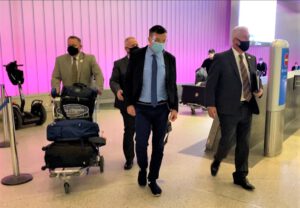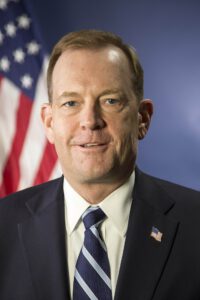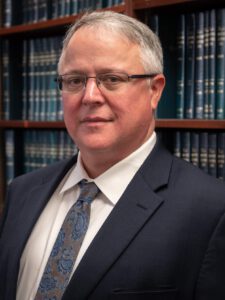
UPDATE: After publication, Judge Sheltzer’s final order reduced Benzeevi’s bail to $1.05m. A full ruling was filed on Wednesday, March 23, and is available at the end of this article.
Dr. Yorai ‘Benny’ Benzeevi is set to have his bail reduced to $1m, a sharp drop from the nearly $4.1m it was set at in 2020, after a tentative ruling on Friday by Tulare County Judge Michael Sheltzer.
Benzeevi is facing a long list of charges relating to his time as CEO of Healthcare Conglomerate Associates (HCCA), the company which managed the Tulare Regional Medical Center from 2014 to 2017 and the Southern Inyo Hospital in Lone Pine, Calif. between 2016 and 2017. He could face up to 40 years in state prison if convicted on all counts, which include alleged crimes committed while managing both hospitals.
He was charged alongside Bruce Greene, an attorney who previously represented Benzeevi, HCCA and the Tulare hospital at various points, and Alan Germany, HCCA’s former Chief Financial Officer. Greene and Germany were able to receive zero bail, and Benzeevi was petitioning the court for zero bail as well.
A family member had paid Benzeevi’s bail in full, his attorney previously wrote in court documents, and would receive the funds back if bail was reduced or set to zero.
Benzeevi and his attorney McGregor Scott were physically present at the Tulare County Superior Court on Friday.
Scott told the Valley Voice that he was pleased with the tentative ruling, which would reduce Benzeevi’s bail by 75%. Benzeevi did not comment.
Trevor Holly, arguing in court on behalf of the Tulare County District Attorney’s office, declined to comment.
Benzeevi not a flight risk, dedicated to fighting charges, attorney says

Scott told the court that Benzeevi was not a flight risk, and that none of the factors used to determine bail – the protection of the public, safety of the victim, seriousness of the offense, the alleged offender’s prior criminal record, and their flight risk – would justify the high amount in Benzeevi’s case.
Benzeevi was not a violent offender, Scott said, negating concerns regarding the protection of the public and safety of the victim; he had not previously been convicted of a crime, negating any concerns over a prior record.
While the charges were serious, they were nonviolent, Scott said. He said that Benzeevi was not a flight risk, because he came back to the country voluntarily, surrendered his passports, and is taking an active role in fighting the charges.
“I probably talk to my client too much,” Scott joked.
Benzeevi had stayed in the country well after he learned of the Tulare County District Attorney’s office investigation in September 2017, and only left for the Philippines in March 2019, Scott said – not the behavior of someone looking to evade justice.
There was a delay between the time his charges were filed – August 2020 – and the time he returned in December 2020, Scott said, due to the coronavirus pandemic and delays from his legal counsel at the time.
In court filings, Scott wrote that Benzeevi “began making arrangements to return to the United States to defend himself against the accusations he faced” as soon as he learned of the charges.
To back up his claim, Scott filed with the court a declaration written by Oliver Wanger, an attorney who represented Benzeevi after the charges were first filed.
“Any delay in coordinating Dr. Benzeevi’s return to the United States with the District Attorney was not due to Dr. Benzeevi, but rather our law firm confirming no conflicts of interest in representing him specifically in this matter,” Wanger wrote.
Benzeevi has surrendered his US passport to the government at the US Embassy in Manila, Philippines, Scott said, and surrendered his Israeli passport to his attorney.
To further assuage any doubts Sheltzer might have, Scott suggested that Benzeevi could surrender his Israeli passport to the court or return it to the Israeli government.
Tackling the specter of funds in hidden bank accounts that Benzeevi could potentially use to leave the country, Scott told the court that officials with the district attorney’s office had effectively zapped any sources of money he could reach.
“There are no other bank accounts,” Scott said. “They’ve frozen all of his money.”
“Pattern of theft and corruption”

While Benzeevi’s US passport may have been surrendered, and his Israeli passport may be in the possession of his attorney, nothing prevents him from asking the Israeli government for another passport, Holly said.
He told the court that Benzeevi had exhibited a “pattern of theft and corruption,” and that while he may have surrendered his US passport, that was only after officials from his office worked to have it suspended.
In filings before the hearing, Holly wrote that “neither Dr. Benzeevi nor his attorneys disclosed his location to law enforcement. Tulare County District Attorney Investigator Rodney Klassen was able to determine that Dr. Benzeevi was in the Philippines prior to the filing of the complaint. Investigators were unable to ascertain where Dr. Benzeevi lived, where he worked, or if he worked.”
“Releasing him OR [on his own recognizance with zero bail] should be a non-starter,” Holly said.
Benzeevi left the country in the middle of a hearing over whether the district attorney’s office could keep funds they had seized from him, Holly told the court, and did not return for a year and nine months.
In the filings Holly wrote that Benzeevi “left the country less than three weeks after receiving funds” from the Tulare Local Healthcare District’s settlement with HCCA, and claimed Benzeevi “clearly was worried about the repercussions of the ruling.”
“There was nothing so important in California that he returned,” Holly said, making the risk he could flee the country greater.
“Benzeevi is clearly able, and well-financed to be able, to live in another country,” he added.
A serious and substantial bail would be necessary to bind him to the country, he told the court.
The compromise solution
Sheltzer said that while he didn’t agree with the idea that Benzeevi was in a similar situation as Greene or Germany – he has significant experience living abroad, for example – he did think Benzeevi’s bail was “probably too high.”
“I don’t mean to be flippant, but [the bail for] garden variety murder is $1,000,000,” he said, saying that the $1m was a compromise solution.
After a preliminary hearing, Sheltzer said he would adjust the bail higher or lower, depending on the weight and substance of the evidence that the prosecution provides.
“We’re confident that at the end of the preliminary hearing, you’ll lower it again,” Scott said.
The reduction wouldn’t take effect until Sheltzer wrote and signed an order, which he expected to file in the next week; Scott requested a “rational analysis” be filed in case an appeal was necessary.
The next hearing in the case will take place on April 14, 8:30am in Department 19 of the South County Justice Center in Porterville.
Dig deeper
Some filings mentioned in this article are available through embeds. Others, including past documents the Voice has used in its reporting, are available on our HCCA Criminal Trial Dockets page.

